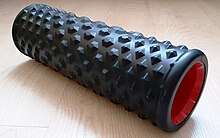Foam roller


A foam roller is a lightweight, cylindrical tube of elastomeric foam used for massaging one's own muscles.[1] The roller is placed between the target muscle and the ground, and is rolled back and forth, using body weight for pressure.
It may be used for many reasons, including increasing flexibility, reducing soreness, and eliminating muscle knots.[2] Foam rolling is a method of self-myofascial release.[3] Foam rollers have a short term positive impact in the range of motion of joints,[3] but long term performance or range of motion benefits are unknown.[4] Combining foam rolling and stretching does not cause a significant impact in range of motion compared to only foam rolling or stretching, but does have a superior effect in performance only if stretching is done after foam rolling.[5] A 2021 analysis of studies concluded that "evidence seems to justify the widespread use of foam rolling as a warm-up activity rather than a recovery tool" while arguing that post exercise or recovery rolling reduced muscle pain perception.[6] A 2019 review concluded that 90 seconds of foam rolling per muscle group may be the minimum needed to achieve a reduction in muscle pain or soreness in the short term but that there is insufficient evidence for the optimal amount.[4]
Rollers come in different sizes and degrees of firmness. The firmness (often identified by the color) can range from soft to firm, soft being best for beginners.[2]
References
[edit]- ^ "Roll away muscle pain". Harvard Health Publishing. December 2017.
- ^ a b "You Asked: Should I Use a Foam Roller?". Time.
- ^ a b Cheatham, Scott W.; Kolber, Morey J.; Cain, Matt; Lee, Matt (December 2015). "The Effects Of Self‐Myofascial Release Using A Foam Roll Or Roller Massager On Joint Range Of Motion, Muscle Recovery, And Performance: A Systematic Review". International Journal of Sports Physical Therapy. 10 (6): 827–838. ISSN 2159-2896. PMC 4637917. PMID 26618062.
- ^ a b Hughes, Garrett A.; Ramer, Leanne M. (December 2019). "Duration Of Myofascial Rolling For Optimal Recovery, Range Of Motion, And Performance: A Systematic Review Of The Literature". International Journal of Sports Physical Therapy. 14 (6): 845–859. doi:10.26603/ijspt20190845. ISSN 2159-2896. PMC 6878859. PMID 31803517.
- ^ Konrad, Andreas; Nakamura, Masatoshi; Bernsteiner, Daniel; Tilp, Markus (2021-07-01). "The Accumulated Effects of Foam Rolling Combined with Stretching on Range of Motion and Physical Performance: A Systematic Review and Meta-Analysis". Journal of Sports Science & Medicine. 20 (3): 535–545. doi:10.52082/jssm.2021.535. ISSN 1303-2968. PMC 8256518. PMID 34267594.
- ^ Wiewelhove, Thimo; Döweling, Alexander; Schneider, Christoph; Hottenrott, Laura; Meyer, Tim; Kellmann, Michael; Pfeiffer, Mark; Ferrauti, Alexander (2019-04-09). "A Meta-Analysis of the Effects of Foam Rolling on Performance and Recovery". Frontiers in Physiology. 10: 376. doi:10.3389/fphys.2019.00376. ISSN 1664-042X. PMC 6465761. PMID 31024339.
